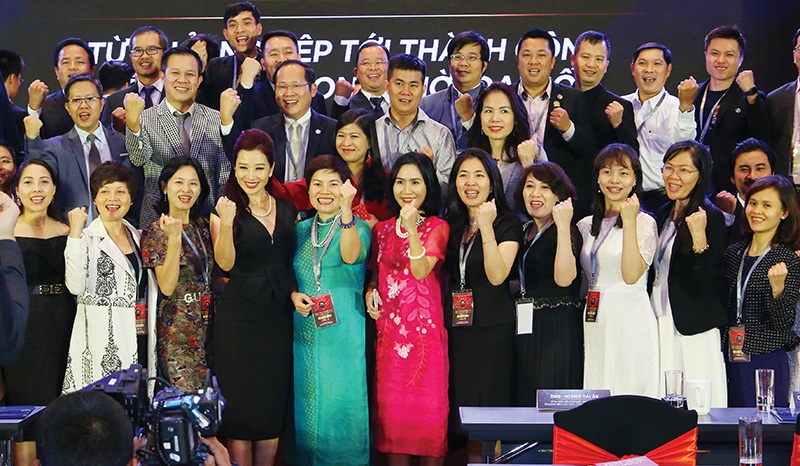Levelling playing field for businesswomen
 |
| Modern businesses realise that women are decision-makers who can transform a company’s fortunes. Photo: Le Toan |
Led by co-founder and CEO Beth Ann Lopez, healthcare booking platform Docosan has raised over $1.2 million thus far. “Female entrepreneurs have insights into female customer bases that male counterparts may not,” Lopez explained. “As women comprise half the population and are increasing spending and decision-making power globally, those insights are powerful.”
Docosan’s all-female founding team used their own insights to dig into certain neglected medical specialities that disproportionately affect women - obstetrics, gynaecology, and paediatrics. “These are the most popular specialities booked on the platform now, showing that when you understand and help women, it can be great business as well,” Lopez added.
Historically, female entrepreneurs have been more limited access to funding, but times are changing. Between this January and August, women-led healthcare startups raised $1.3 billion across 26 deals – nearly double all of 2020’s funding. “And this is just in healthcare. Women are often the decision-makers on when and what their families buy across industries like health, consumer goods, education, and more,” said Lopez. “And so, female entrepreneurs are innovating in all these kinds of areas.”
Women are actively involved in Vietnam’s entrepreneurship landscape. Fika, a Vietnamese-based social and dating app led by co-founder Denise Sandquist, raised $1.6 million in funding last week. Meanwhile, Mai Linh has set up MeiVentures, a unique global venture capital fund specialising in early-stage development.
In July, Beacon Fund, an investment firm supporting female entrepreneurs in Southeast Asia, received $5 million investment from Sasakawa Peace Foundation. The fund has a long history of supporting women-led startups in Vietnam, including companies such as Kim An Group, JupViec, and Canal Circle.
Shuyin Tang, Beacon Fund’s co-founder and CEO told VIR, “Our focus is actually on small- and medium-sized enterprises rather than startups. Over the past decade of engaging with and investing in female entrepreneurs, we realised that there is a significant opportunity amongst the ‘missing middle’ of firms that do not fit the traditional private equity/venture capital models which dominate the market. There is a vastly underserved segment of businesses whose growth profile does not match with the expectations of these models, but are creating considerable value for their customers and stakeholders.”
Beacon Fund’s investments range from $500,000 to $2 million, with the potential to go down to $200,000 if the business contributes to COVID-19 recovery. Since its launch last year, Beacon Fund has invested in one education company in Vietnam.
Tang admitted that women can face additional challenges in networking, finding mentors, or dealing with biased investors. “It’s easy to say the right things but the reality is that everyone has some kind of bias, and we’ve found it helpful to explore what these might be in our own team and processes,” she added.
In March, the Cherie Blair Foundation for Women released its annual audit of women entrepreneurs in 32 low- and middle-income countries, Vietnam included. The vast majority of the women (83.8 per cent) reported a negative business impact from the pandemic, while nearly four in 10 reported that their business will or may have to close as a result. These numbers will not be dissimilar in Vietnam.
Elsewhere, AVPN is a network of funders and resource providers with over 600 members across 32 markets with a mission to move more social investment toward Asia. It has been leveraging this network to promote gender lens investment (GLI). Earlier this year, it held a series of GLI events in Vietnam with regional partner Investing in Women.
In August, AVPN also launched GLI Fellowship for Asia, bringing together professionals to share their experience and learn from qualified GLI professionals and trainers.
What the stars mean:
★ Poor ★ ★ Promising ★★★ Good ★★★★ Very good ★★★★★ Exceptional
Related Contents
Latest News
More News
- Japanese business outlook in Vietnam turns more optimistic (January 28, 2026 | 09:54)
- Foreign leaders extend congratulations to Party General Secretary To Lam (January 25, 2026 | 10:01)
- 14th National Party Congress wraps up with success (January 25, 2026 | 09:49)
- Congratulations from VFF Central Committee's int’l partners to 14th National Party Congress (January 25, 2026 | 09:46)
- 14th Party Central Committee unanimously elects To Lam as General Secretary (January 23, 2026 | 16:22)
- Worldwide congratulations underscore confidence in Vietnam’s 14th Party Congress (January 23, 2026 | 09:02)
- Political parties, organisations, int’l friends send congratulations to 14th National Party Congress (January 22, 2026 | 09:33)
- Press release on second working day of 14th National Party Congress (January 22, 2026 | 09:19)
- 14th National Party Congress: Japanese media highlight Vietnam’s growth targets (January 21, 2026 | 09:46)
- 14th National Party Congress: Driving force for Vietnam to continue renewal, innovation, breakthroughs (January 21, 2026 | 09:42)

 Tag:
Tag:




















 Mobile Version
Mobile Version